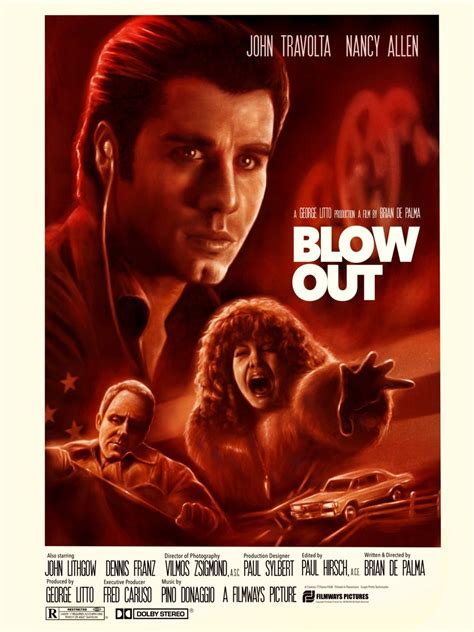Blow Out

Description:
Blow Out is a gripping thriller that follows Jack Terry, a sound technician for low-budget horror films, who inadvertently records evidence of a car accident that turns out to be a politically motivated murder. As Jack delves deeper into the mystery, he becomes entangled in a web of conspiracy and deceit. The film showcases De Palma's masterful direction, combining suspenseful storytelling with innovative sound design, creating an enthralling cinematic experience.Keywords:
Conspiracy, Surveillance, Sound Design, Thriller, ParanoiaWhy is Blow Out so good?
"Blow Out," directed by Brian De Palma, is highly regarded for its masterful blend of suspense, sound design, and commentary on media manipulation. The film follows a sound technician, played by John Travolta, who inadvertently records a murder, leading him into a web of conspiracy. De Palma's use of split-screen techniques and meticulous attention to audio enhances the narrative's tension. The film also explores themes of truth versus illusion, making it both an engaging thriller and a thought-provoking critique on the power of film and perception.
Is Blow Out worth watching?
"Blow Out," directed by Brian De Palma and released in 1981, is widely regarded as a suspenseful and stylish thriller. It stars John Travolta as a sound technician who inadvertently records evidence of a political assassination. The film is notable for its exploration of sound and film, as well as its critique of media manipulation. With strong performances, particularly from Travolta and Nancy Allen, and a gripping narrative, "Blow Out" is often praised for its direction and atmosphere. If you enjoy psychological thrillers with a cinematic edge, it's definitely worth watching.
What was the movie Blow Out about?
"Blow Out," directed by Brian De Palma, follows sound technician Jack Terry, played by John Travolta, who accidentally records a car accident while working on a low-budget horror film. As he investigates the incident, he uncovers a conspiracy involving a political assassination. Jack becomes entangled with a woman, played by Nancy Allen, who was involved in the accident. The film explores themes of perception, reality, and the impact of sound, culminating in a tense and dramatic climax that questions the nature of truth and media influence.
Is Blow Out a remake of Blow Up?
Yes, "Blow Out" (1981), directed by Brian De Palma, is often considered a loose remake of Michelangelo Antonioni's "Blow-Up" (1966). Both films center around a sound technician or photographer who inadvertently captures evidence of a crime while working. While "Blow-Up" explores themes of perception and reality through visual imagery, "Blow Out" focuses on sound and features a more straightforward narrative involving political conspiracy, making it distinct yet thematically linked to its predecessor.
Explore More Categories: